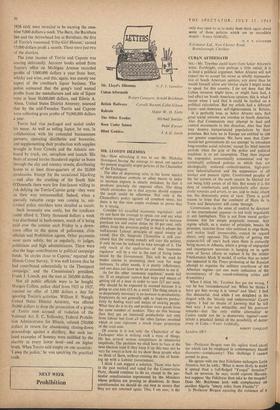Mr. Lloyd's Dilemma N. F.7'. Saunders
Cuban Aftermath Robert Conquest, Arnold Beichman
British Railways Correlli Barnett,Colin Gibson Bahrain Major W. 0. Little The Other Exodus Michaellonides Born Under Saturn Peter Forster Blind Goddess J. A. G. Smith
MR. LLOYD'S DILEMMA
SIR,—How refreshing it was to see Mr. Nicholas Davenport having the courage to speak out against the present tragically stupid policies of the Chancellor of the Exchequer.
The idea of depressing sales in the home market by hire-purchase controls or other means in order to increase exports is clearly mistaken. In fact it produces precisely the opposite effect. The thing which astonishes me is that anyone should suppose the result could be otherwise. Not only is the Chancellor's policy against all common sense, but there is by this time ample evidence to prove that he is wrong.
Consider his so-called 'economic regulators': will no one have the courage to speak out and say what absolute nonsense they are? The proposal to increase purchase tax and excise duties by 10 per cent, only differs from the previous policy in that it adopts the well-known Labour principle of equal misery all round. Our Dr. Sangrado Chancellor is still con- vinced that the wrong remedy will cure the patient, if only he can be induced to take enough of it. The only result of the application of this `economic regulator' will be a rise in the cost of living index issued by the Government. This will be used by trades unions in presenting their case for wage increases. In other words, it is purely inflationary, and one does not have to be an economist to see it.
As for the other 'economic regulator,' words fail me. If an employer cannot find ways and means of getting rid of a man in order to save f15 per week, Why should he be expected to succeed because it is going to cost him £15 4s. a week? The thing which is so desperately necessary is an increase in productivity. Employers do not generally seek to improve produc- tivity by finding ways and means of sacking people. What they do is to try and produce more goods from the same number of workers. They do this because then they get an increased productivity not only from labour but from all the other factors involved which in toto represent a much larger proportion of the total cost.
Of course it is not only the Chancellor of the Exchequer who is making such a mess of things. He has several serious competitors in ministerial ineptitude. The problem we shall have to face at the next election (and if they keep it up this may not be very far away) is how do we show these people what we think of them, without running the risk of finish- ing up with a Labour Government.
I think I can suggest a solution. Those who have in the past worked and voted for the Conservative Party, should continue to do so, except in the par- ticular constituencies represented by the Ministers whose policies are proving so disastrous. In those constituencies we should do our best to ensure that they are not returned again. This, I am sure, is the
only way open to us to make them think again about some of these policies which are so incredibly stupid.—Yours faithfully, Kelvinator Ltd., New Chester Road, Bromborough, Cheshire


















































 Previous page
Previous page